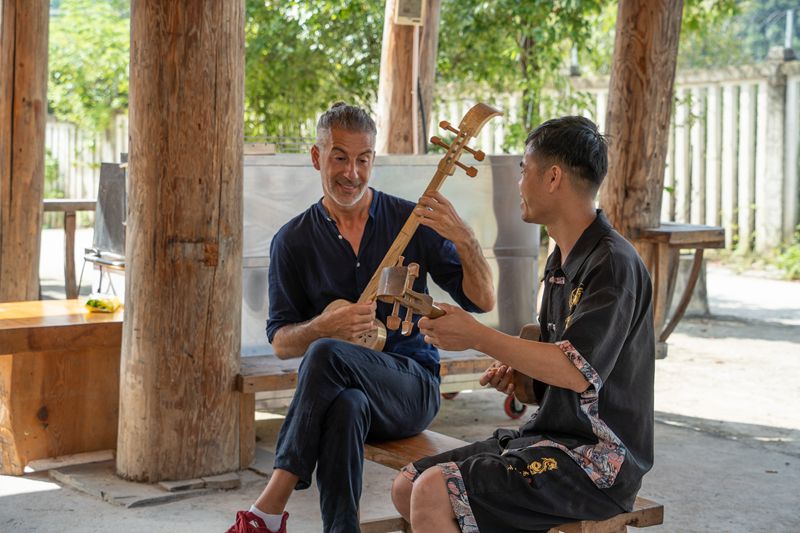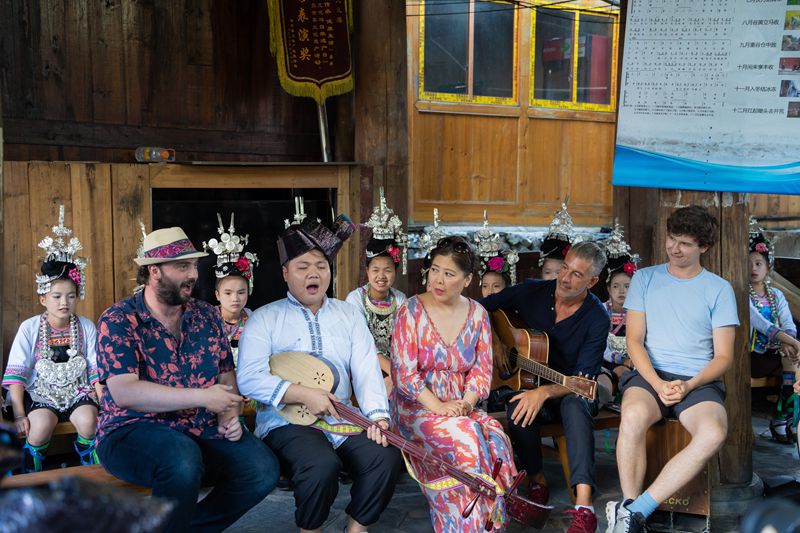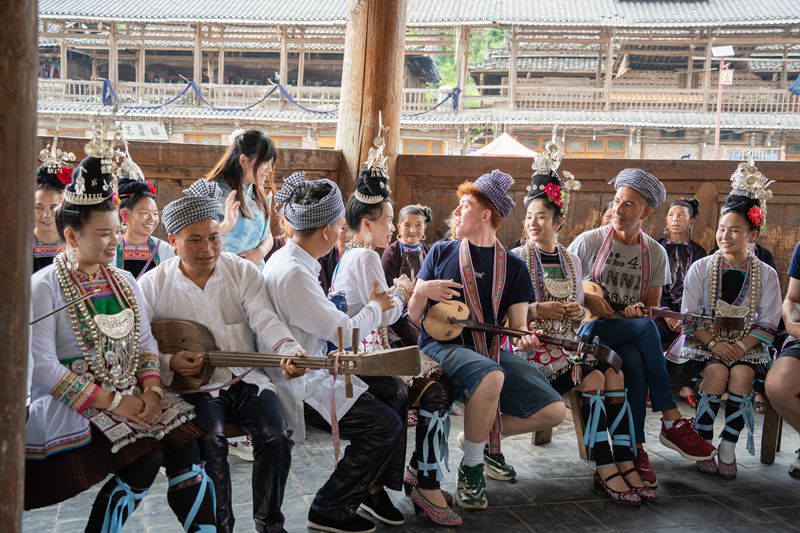European musicians enchanted by Dong ethnic culture in SW China's Guizhou
The European musicians from the "My Music Paradise--China Europe Young Musicians Art Exchange Global Communication Initiative" travelled to Dong ethnic villages in the southeast part of southwest China's Guizhou Province, where the harmony of ancient songs and terraced landscapes left them in awe.

European musicians visit the Huanggang Dong village, Li Ping county, Guizhou Province. (Photo/Yang Qian)
In Tang'an Dong village, a UNESCO-listed traditional village in Liping county, all the musicians received a grand welcome with exuberant singing and dancing. As this was not their first visit to an ethnic village in the province, they were already familiar with the gate-blocking ceremony, which involves drinking wine to pass through the entrance, and they interacted enthusiastically with local villagers. They even began learning from local folk musicians, gradually mastering the craft of making and playing the Dong pipa, a traditional musical instrument.

Italian composer Andrea Granitzio learns the Dong Pipa from local craftsman. (Photo/Yang Qian)
Under the bright sunlight, Italian composer Andrea Granitzio stood beside the emerald rice terraces, capturing the whispers of cicadas and rustle of rice stalks on his phone. "This is nature's own orchestra," he murmured. Later, inside the village's iconic drum tower, he listened intently to the polyphonic Grand Song of the Dong ethnic group, their voices seeming to channel the entire mountain range into melody. “It's transcendent," Granitzio commented after learning about the 2,500-year-old tradition from local singers.
British tenor Thomas Lidgley started a cross-cultural dialogue by demonstrating the nuances of Western operatic techniques versus Dong’s resonant, improvisational style. "The Dong's harmonies are so organic, just like the land itself is singing. In opera, we chase perfection, but here, music flows like water," he reflected. The villagers, though unfamiliar with the Italian language, clapped along to his aria, proving music's universal language.
At Huanggang Dong Village, the warm welcome moved the group deeply. A group of little girls in intricate hand-embroidered costumes sang with such crystalline clarity that the musicians labelled them "born with music in their DNA."
The drum tower became an impromptu stage. Bogdan Skrypka, a British percussionist, layered rhythms on his electronic drum pad, while British violinist Gwyneth Nelmes mirrored the drone of the Dong's bull-leg fiddle. Then the spotlight turned to Wu Hualin, affectionately nicknamed "Little Fatty" by locals, whose raw vocal talent left the professionals stunned.

Wu Hualin shows his vocal skill to European musicians. (Photo/Yang Qian)
"He learned a classical piece in minutes from Thomas," soprano Wang Beibei said, advising him to consider conservatory training. Wu Hualin replied "I'd always come back, my roots are here," drawing laughter and applause, and embodying the Dong's deep ties to their homeland.
Many Dong villagers said it was their first time listening to Western opera live, describing it as melodious and captivating. Meanwhile, European musicians were amazed by the Dong chorus's ability. "How do they achieve flawless harmony without a conductor or instrumental accompaniment?" asked Granitzio.
Wu Jiaxian, a Dong culture expert and deputy director of the Liping Dong Culture Association, analyzed this phenomenon from a cultural perspective. He explained that the Dong chorus originally began as unison singing with a single vocal part. However, as more participants joined, varying vocal tones naturally formed multiple harmonies. "The harmonious blend of the Dong chorus is not just a musical technique—it reflects the inclusive, united, and confident collective consciousness and social order of the Dong community," Wu Jiaxian said.
In the heart of the Dong village, the genuine warmth of the locals deeply moved the musicians, reminding them that such authenticity of human connection should be at the core of music itself. When the European musicians invited the Dong people to sing "Auld Lang Syne" together, language posed no barrier. Some didn't understand Chinese, while others did not speak English, yet, the shared melody rose from their hearts, echoing through the mountain valleys.

European musicians sing with local Dong villagers. (Photo/Yang Qian)
As dusk fell, these people from different corners of the world became friends. Hand in hand, they danced in concentric circles. "No one wanted it to end," said Lidgley. "This is why music exists — to erase borders, even for just one night."

 Scan the QR Code
Scan the QR Code